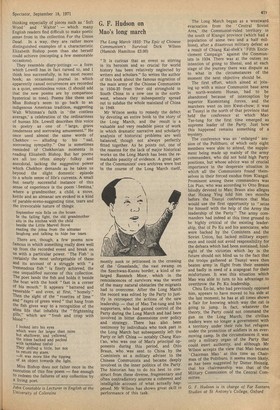"It is curious that an event so stirring in its
heroism and so crucial for world history has been relatively neglected by writers and scholars." So writes the author of this book about the famous migration of the main army of the Chinese Communists in 1934-35 from their old stronghold in South China to a new one in the northwest, whence they subsequently spread out to subdue the whole mainland of China in 1949.
Mr Wilson seeks to remedy the defect by devoting an entire book to the story of the Long March, and the result is a valuable and very readable piece of work in which dramatic narrative and scholarly analysis of historical problems are well balanced, though not always perfectly fitted together. As he points out, one of the reasons for the lack of major historical works on the Long March has been the remarkable paucity of evidence. A great part of the Communists' own archives were lost in the course of the Long March itself, mostly sunk or jettisoned in the crossing of the 'Grasslands,' the vast swamp on the Szechwan-Kansu border, a kind of enlarged Rannoch Moor, which in the reminiscences of survivors was the worst of the many natural obstacles the migrants had to overcome. After the Long March the record was edited by the Party to justify in retrospect the actions of the new leadership — that of Mao Tse-tung and his supporters, who had gained control of the Party during the Long March and had been involved in bitter dissensions over policy and strategy. There has also been testimony by individuals who took part in the Long March but subsequently left the Party or left China — notably Chang Kuot'ao, who was one of Mao's principal opponents during this period, and Otto Braun, who, was sent to China by the Comintern as a military adviser to the Chinese Communists and became deeply involved in the inner politics of the Party. The historian has to do his best to construct from these diverse, fragmentary and often contradictory sources a coherent and intelligible account of what actually happened. Mr Wilson has shown great skill in performance of this task.
The Long March began as a westward evacuation from the 'Central Soviet
Area,' the Communist-ruled territory in the south of Kiangsi province (which had a population of some two and a half mil lions), after a disastrous military defeat as a result of Chiang Kai-shek's Fifth Encirclement Campaign' against the Commun ists in 1934. There was at the outset no intention of going to Shensi, and at each stage of the journey there was dispute as to what in the circumstances of the moment the next objective should be.
The first effort, which aimed at joining up with a minor Communist base area in north-western Hunan, had to be abandoned because of interception by superior Kuomintang forces, and the marchers went on into Kwei-chow; it was at Tsunyi in the north of that province that held the conference at which Mao Tse-tung for the first time emerged as supreme leader of the Party. Just how this happened remains something of a mystery.
The conference was an 'enlarged ' session of the Politburo, of which only eight members were able to attend, the supple ment being made up mainly of the army commanders, who did not hold high Party positions, but whose advice was of crucial importance in the desperate situation in which all the Communists found them selves in their forced exodus from Kiangsi.
Prominent among these commanders was Lin Piao, who was according to Otto Braun blindly devoted to Mao; Braun also alleges that Hsiang Ying told him two months before the Tsunyi conference that Mao would use the first opportunity to "seize for himself with the help of the Army the leadership of the Party." The army com manders had indeed at this time ground to be highly critical of the existing leadership, that of Po Ku and his associates, who were backed by the Comintern and the Soviet Union, but lacked military experience and could not avoid responsibility for the defeats which had been sustained; hind sight of the victories which lay in the future should not blind us to the fact that the troops gathered at Tsunyi were then beaten army in flight from their enemies and badly in need of a scapegoat for their misfortunes. It was this situation which Mao was able to turn to his advantage to overthrow the Po Ku leadership.
Chou En-lai, who had previously opposed him, appears to have moved to his side at the last moment; he has at all times shown a flair for knowing which way the cat is going to jump. In fact, whatever the theory, the Party could not command the gun on the Long March; the civilian leaders were no longer a government with a territory under their rule but refugees under the protection of soldiers in an evermoving camp. In the circumstances it was only a military organ of the Party that could exert authority, and although Mr Wilson accepts the view that Mao became 'Chairman Mao' at this time as Chairman of the Politburo, it seems more likely, as has been suggested by Dieter Heinzig, that his chairmanship was that of the Military Commission of the Central Committee.
G. F. Hudson is in charge of Far Eastern Studies at St Antony's College, Oxford


































 Previous page
Previous page